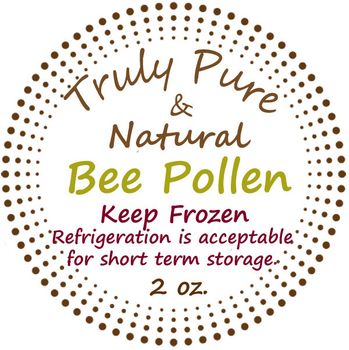TPN Bee Pollen 2 oz
Local PA Bee Pollen
Bee Pollen: Nature's Complete Protein Source
Pollen found in the honeycomb has been used as ancient food and medicine for centuries. Testimonials to the use of pollen abound in the great bodies of literature, which include: the Bible, the Koran, Hindu, Egyptian, and modern or twentieth century literature. Russian scientists gave bee pollen to their Olympic teams, with results of increased stamina, soon afterwards, the British and Americans followed. Today, most major league ball teams use bee pollen in their training schedules.
Many plants produce a sweet watery mixture within their flowers called nectar to attract honeybees. As the honeybee collects the nectar from which honey is made, she also gathers pollen. Pollen is the male sperm of flowers and is formed on the stamens as tiny grains. Fertilization of the plant occurs when the pollen grains are brushed or blown onto the female stigma of the flower. The pollen grains grow pollen tubes through the stigma and style of the flower and down to the ovule(s), or the female "egg(s)" of the flower. There, fertilization takes place and the seed(s) are formed. Many flowering plants, including many of our food plants, such as fruit trees, berries and vegetables are dependent on bees distributing the pollen for pollination.
Bees use pollen as a protein source and flower nectar as a carbohydrate (energy) source. During the pollen collection the bees become covered with dust and transfer pollen from one flower to another. To collect the pollen for use, the honeybee scrapes it from her body with her jaws and bristles (pollen combs) on her front legs and presses it into her "pollen baskets", located on the sides of her rear legs. Bee pollen is collected for use as food by honeybees for all the developmental stages in the hive.
People and animals as well as bees can benefit from eating bee pollen. Extensive analysis has indicated that pollen is a storehouse of protein, vitamins, and minerals. It has been found to contain 18 amino acids and is a superb source of the entire B complex chain. Pollen also contains notable amounts of Vitamin A, C, D, & E. About 35% of its content is protein, half of which is in the form of readily assimilated free amino acids, 25% is comprised of various types of natural sugar, 5% is fats, and 3% to 4% is moisture. The remaining material is a combination of minerals, hormones, and trace elements such as potassium, magnesium, calcium, copper, iron, silicon, phosphorus, sulfur, chlorine, manganese, thiamin, riboflavin, nicotinic acid, pyridoxine, pantothenic acid, biotin, folic acid, and lactoflavine. The pollen was fed to mice, demonstrating that pollen is a complete food and that it is possible to let several generations be born without the least sign of distress while nourishing them exclusively on bee pollen.
The large proportions of free amino acids, especially methionine, a specific medicine for the liver, explain the favorable results to that organ when ingesting bee pollen. More medical experience teaches that the ingestion of bee pollen is recommended in the case of digestion difficulties, arteriosclerosis, and has a favorable influence in cases of infertility, both male and female. Bee pollen contains all the essential elements for life. The percentage of revivifying and rejuvenating elements in bee pollen is remarkable, far exceeding those present in brewer's yeast and wheat germ. Bee pollen corrects the failings due to deficient or unbalanced nutrition, common in the customs of our present day civilization on consuming incomplete foods, often with added chemical ingredients, which expose us to physiological problems as various as they are numerous.
Modern medicine has rediscovered the benefits of bee pollen for sufferers of allergies. Ingesting small amounts of bee pollen daily, thus building a natural immunity has successfully treated relief from hay fever, asthma, sinus conditions, and bronchitis. Russian scientists have attributed the longevity of their centurions to daily doses of bee pollen in their diets. Since bee pollen contains protein as simple amino acids, all the vitamin components, minerals and enzymes, many physicians and scientists have described it as a perfect food and as a natural energizer.
Many other studies have reported that bee pollen is a complete food and contains many elements that products of animal origin do not possess. Bee pollen is richer in proteins than any animal source. It contains more amino acids than beef, eggs or cheese of equal weight. It has also been reported that bee pollen is the finest, most perfect food. The health restoring properties of honeybee pollen has been proven time and time again. Honeybee pollen not only builds up strength and energy in the body, but also gives increased resistance to infection. Other experiments reported that bee pollen contains antibiotic factors affective against E. Coli, Proteus and salmonella organisms. Pollen nutritional studies on people have noticed an increase in healthy red and white blood cells and a reduction of cholesterol and triglycerides in the blood has also been reported. Other benefits include a lessening of nausea during chemotherapy; relief of menstrual and menopausal symptoms; decrease in chronic prostrate inflammation; increase of alertness and reduction of antisocial behavior in troubled teenagers.
When in season, I harvest my bee pollen daily using a pollen trap that knocks a percentage of the pollen off of the bee's legs. I then store it in a freezer so that I may offer the freshest pollen available. Upon receiving pollen, you need to store it in a freezer. It will keep for one year or longer with no nutritional loss.
Very few people are allergic to bee pollen. Therefore, it is suggested that people start taking small amounts of bee pollen and gradually increase the amount until they are taking 2 tablespoons daily. If slight allergic symptoms occur, temporarily decrease the amount taken, Soon the symptoms will disappear. However as with all new foods that you may sample, consult a physician if severe symptoms occur.




